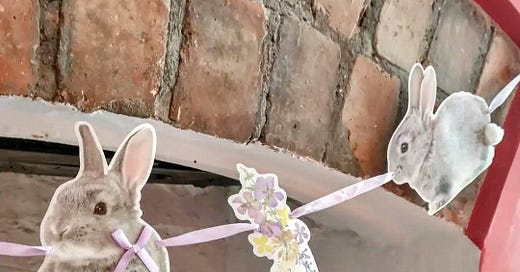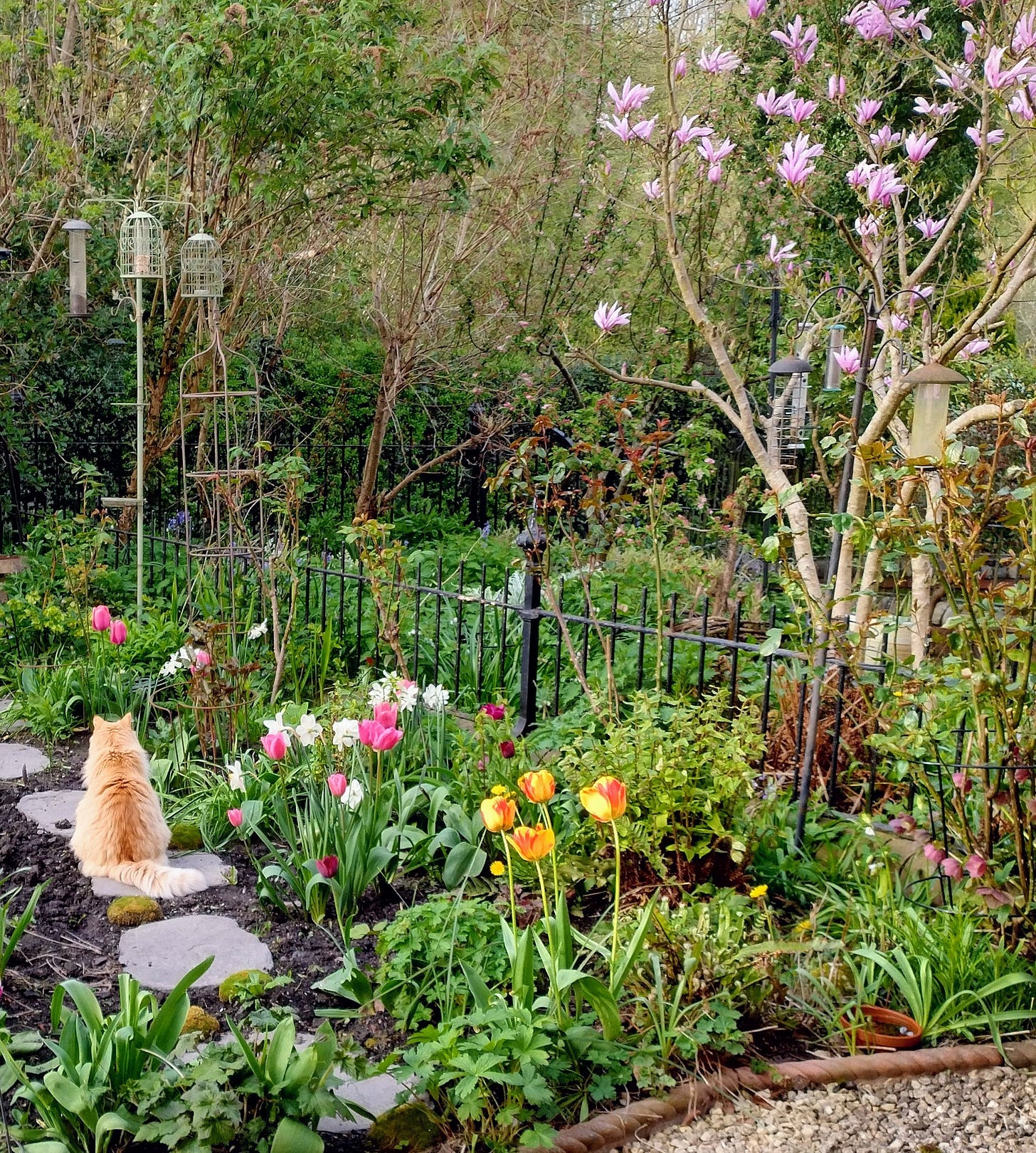On hope and falling back in love with writing
a new season brings ways to step away from self sabotage
April brings promise realised. The bulbs planted in hope last spring are in full bloom, the seeds sown in chilly march are peeping through the soil, with leaves so delicate is seems impossible that they will become unruly, exuberant plants that crowd my garden or glossy green courgettes. April brings Easter, named for Eostre, goddess of light and new growth and I’m not ashamed to say I feel a rush of joy at the prospect of hanging up my bunny bunting.
April is also the cruellest month, a phrase I knew but only really examined recently. Eliot’s famous opening to The Waste Land challenges the popular comfort that April brings renewal and hope, instead exposing it as a place of disappointment and promises lost. It’s an account of despair and alienation and whilst there are aspects of Eliot’s writing that are problematic, the subversion of one of the most accepted symbols of hope is undoubtedly powerful.
I wonder if this, like so many things is about expectation and perception. We expect to feel joy and lightness, we expect to feel hope and renewal. It’s hard though, in the face of the horrors on our screen each day, in the face of the absurdity of buying a host of new stuff to redecorate your house for spring, whilst ignoring the real beauty outside. It’s this confusion of expectation and disappointment that threatens any kind of peace when it comes to writing. It’s something I want to understand, and to step away from, so I can genuinely love the way I spend my days, rather wading through a dank pool of disappointment.
Hope can become pressure
I’ve recently completed a Poetry School course “From Darkness into light” led by the wonderful Jessica Traynor. The course was designed to lead us from the dark winter months through to the light and promised of spring. I wrote a lot of poems, including one about the sex life of slugs, which I used a metaphor for corruption – one day I’ll publish it. Our final assignment invited to us to explore the contrast between the tradition of spring, and the reality of a month that bears a strong trace of winter. Here is a first draft of my response.
Spring
He planted daffodils, look, and crocuses, look,
soon there’ll be orange blossom, and we’ll wince
at its sickly scent-promise of unimaginable summer.
Let’s look in the greenhouse, shut up since December
there may be treasure,
something that survived. Lift white fleece
laid like snow to protect from cold,
see rank fur of fungus, sprinkles of mould,
see decayed stems, look closer, seek hope.
There’s a confusion of hope in this poem – it’s there but brutally tempered by reality, and an awareness of loss and failure. I ricochet between these emotions with unnerving regularity. Except when it comes to my garden.
Hope can be reality
If you’re not of the horticultural persuasion, let me explain a little more. A garden has lots of failures; seeds that don’t germinate, plants that succumb to frost over winter, vegetables that grow in a way that is most definitely not edible. There is never a year where something doesn’t work out as I hoped. Yet somehow, I accept this transience and uncertainty. When failure occurs, I apologise to the plant I’ve let down (I know, I know) clear it away and move on. I don’t feel personally affronted; I don’t feel that I never want to garden again, and I don’t feel that everyone else knows what they’re doing and I’ll never reach gardening nirvana. Sure, experts exist and show their skills at fancy flower shows but I honestly don’t care. All I’m worried about is my patch of colour and joy, and how to solve the puzzle of keeping geraniums alive over winter.
I wonder if this about immersion in the task? During a recent appointment, my psychiatrist asked of there was ever a time when I felt truly present in my own life. Without missing a beat, I responded that it’s when I garden. This is the only time when the voices of others don’t crowd my brain, the only time when I bathe in the joy of noticing and the only moment when I can lose track of time. In short, it’s when I let go.
I long for this to be the case with writing, to be a writer who works through the night, forgetting to eat because they are so immersed in their work. I am not. I love writing and need to do it yet cannot switch off the outside world. I’ve heard reams of advice “write for yourself” “don’t get it right get it written” “write as if nobody’s watching” (ok I made that last one up, but you get my gist) but I cannot do it. I always have the longing of publication in the back of my mind and have honestly reached the point where I want to get my much-shortlisted pamphlet published so I can move on and maybe forget about it all for a bit. Take up macrame, or watercolours instead.
How I can fall back in love with writing
The answer to being content with my writing lies in my garden. It lies in learning to nurture my words with the same care and tenderness I give to an emerging courgette seed (I genuinely cheer when I see them). It lies in accepting failure with a cool understanding that sometimes things just don't work, that I've chosen the wrong place for the plant and I'll learn for next time. Above all it lies subverting the need for external validation and learning to enjoy the words for the way they delight me, the way they feel on my tongue, the thrill of raising my eyes to sky, seeking the right word and plucking it down to be part of the page.
As the year unfolds, as April continues its journey to the heat and celebration that summer can bring, my goal is to keep my heart light, to keep my mind trained on what brings me joy and to fall back in love with writing. Which I will, if I learn to write with the same perspective I have when I garden.
Until next time
Kathryn
xx






Kathryn, this is lovely and makes complete sense. And i think it’s gorgeous to apologize to a plant for letting it down. Aren’t there studies showing that they like to be spoken to, or certain music more than others?